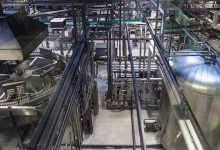The Australian Renewable Energy Agency is looking to encourage food manufacturers to increase the use of renewable energy technologies in food production, announcing a new round of funding for Australian food producers to develop plans for shifting their energy use to zero emissions sources.
ARENA has committed $460,000 in funding to the Australian Alliance for Energy Productivity (A2EP) for a research initiative examining the greater use of renewable energy in food processing.
Some aspects of food processing can be highly energy intensive, particularly processing that requires the heating of foods to high temperatures. Many companies rely on natural gas to produce the required heat, but ARENA is keen to see companies incorporate alternatives such as solar thermal collectors as a lower cost, zero emissions, alternative.
ARENA is chipping in around half of the funds for the $900,500 project to be lead by A2EP, which will support food companies to undertake up to ten pre-feasibility studies at sites across Australia. The project aims to identify up to five high merit projects to progress to full feasibility studies.
ARENA hopes these subsequent five feasibility studies can be completed by the end of 2019, with the proposals potentially eligible for further ARENA funding to implement the renewable energy alternatives.
The initiative has already identified three businesses that will undertake pre-feasibility studies, including frozen food producers McCain and Simplot and the Lion brewing company in South Australia.
“A2EP’s project aligns with what ARENA is aiming to achieve through its new investment priority in helping industry to reduce emissions by supplying case studies which can be replicated more widely,” ARENA CEO Darren Miller said.
Much of the focus on renewable energy development has focused on the use of sources like solar and wind to produce electricity. Many factories, and large industrial operations, have been successful in incorporating rooftop solar installations to offset electricity consumption and reduce operating costs.
ARENA believes there is a substantial opportunity to go a step further and to incorporate thermal renewable energy sources directly into industrial operations.
“There is significant potential to increase the application of renewable energy for process heating in manufacturing. By switching to renewable energy technologies, industries such as food and beverage processing can significantly reduce their reliance on traditional forms of energy and save money on their operating costs, thereby encouraging more companies to adopt this approach,” Miller added.
There is a significant, largely untapped, opportunity in Australia to drive greenhouse gas emissions reductions by shifting industrial energy use on to renewable sources. It is also an opportunity that could deliver substantial cost savings to businesses that have been reliant on the use of expensive natural gas.
A2EP CEO Jonathan Jutsen sees Australia effectively falling behind other countries that have a long history and experience with using renewable sources to produce industrial heat.
“Australia lags behind other economies in deployment of process heat technologies that are innovative but proven. There is great potential to be smarter about process heat. We waste a great deal of energy and we don’t take advantage of cost-effective renewables. There are literally thousands of businesses that could benefit from these ideas,” Jutsen said.
“With the support of ARENA, this feasibility work will identify opportunities for manufacturing businesses across Australia to transition to cost-effective renewable energy solutions tailored to their businesses that will reduce their emissions and energy costs.”
The initiative follows ARENA’s direct engagement and consultation with industry on the potential uses of renewables in industrial processes, including through a two-day consultation workshop held in Sydney in July.








